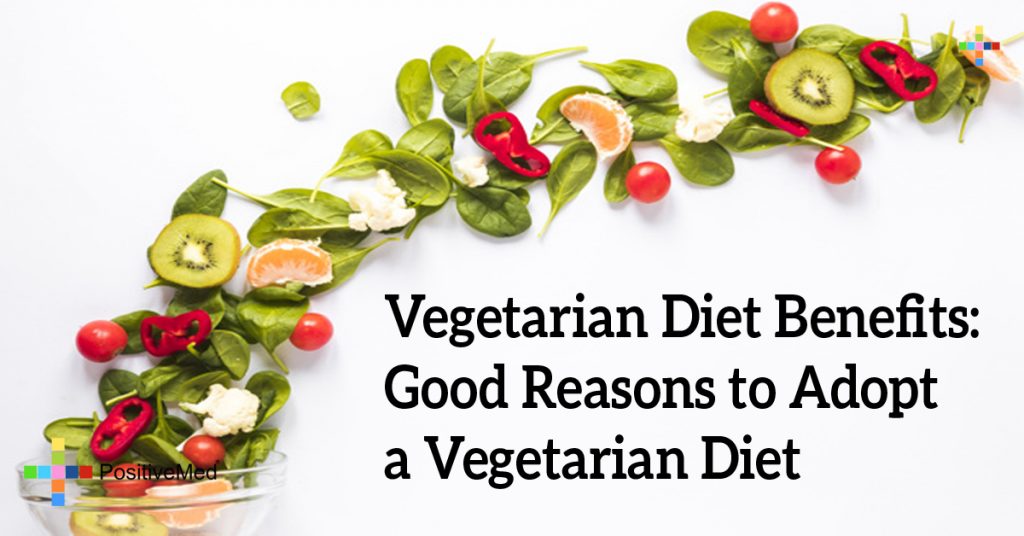
Vegetarian Diet Benefits: Good Reasons to Adopt a Vegetarian Diet
A vegetarian diet is a powerful and pleasurable way to achieve good health. The vegetarian eating pattern is based on a wide variety of foods that are satisfying, delicious, and healthy. Vegetarians avoid red meat, fish, and poultry. Those who include dairy products and eggs in their diets are called Lacto-Ovo vegetarians. Vegans, pure vegetarians, eat no meat, fish, poultry, eggs, or dairy products. There are great benefits to Lacto-Ovo diets, but a vegan diet can be healthiest of all, reducing risk of a wide range of health problems. This article will review the major vegetarian diet benefits, ending with some recommendations on how to meet the daily nutrient recommendations.
Vegetarians have lower cholesterol levels than meat-eaters , and heart disease is rare among vegetarians. Vegetarian meals are typically low in saturated fat and usually contain little or no bad cholesterol. Since cholesterol is found only in animal products vegans consume a naturally cholesterol-free diet . Even the types of protein in vegetarian diets is an advantage, studies show replacing animal protein with plant-based protein lowers blood cholesterol levels, even if the amount and type of dietary fat remains the same. These studies show that a low-fat vegetarian diet has an advantage over other diets for cholesterol.
An impressive number of studies, starting from the 1920s, show that vegetarians have lower blood pressure than non-vegetarians. In fact, studies show that adding meat to a vegetarian diet raises blood pressure rapidly and significantly. A vegetarian diet is often lower in sodium. When people with hypertension begin a vegetarian diet, many are able to safely eliminate blood pressure medication.
The latest studies on diabetes show that a diet rich in complex carbohydrates, found only in plant foods, and low in fat is the best dietary prescription for controlling diabetes. Since diabetics are at high risk of heart disease, avoiding fat and cholesterol is an important objective of a diabetic diet and the vegetarian diet is ideal. Although all insulin-dependent diabetics need to take insulin, plant-based diets can help reduce insulin requirements.
A vegetarian diet helps prevent cancer. Studies of vegetarians show that death rates from cancer are 1/2 to 3/4 of the general population. Breast cancer rates are dramatically lower in countries where diets are typically plant-based. When those countries adopt a Western, meat-based diet their rates of breast cancer increase. Vegetarians also have significantly less colon cancer than meat eaters, eating meat is more closely associated with colon cancer than any other dietary factor.
Vegetarian diets can help prevent cancer because they are lower in fat and higher in fiber than meat-based diets. Also, they usually eat more beta-carotene, which may explain why they have less lung cancer. At least one study has shown that the natural sugars in dairy products may increase the risk of ovarian cancer in some women. Some of the anti-cancer aspects of a vegetarian diet cannot be explained, for example researchers are not sure why vegetarians have more white blood cells called ‘killer cells,’ which are able to seek out and destroy cancer cells.
Vegetarians are less likely to form kidney stones or gallstones and may have lower risk for osteoporosis because they eat little to no animal protein. High intake of animal protein encourages loss of calcium from bones, replacing animal products with plant foods reduces the amount of calcium lost. This may help explain why people who live in areas where diets are plant-based have little osteoporosis even when calcium intake is low.

If you’re impressed by these vegetarian diet benefits, you should also know that it’s easy to plan a vegetarian diet that meets your daily nutrient needs. Cereals, nuts, and vegetables are rich in protein and iron. Green leafy vegetables, legumes, nuts, and dried fruits are excellent sources of calcium.
Vitamin D is produced naturally by the body when exposed to the sun. That’s why vitamin D is also called “The Sunshine Vitamin“. Those who enjoy regular sun exposure usually don’t need vitamin D from food. People with darker skin or who live in northern latitudes have difficulty producing enough vitamin D all year, it can be easily obtained from fortified foods.
Vitamin B12 is plentiful in fortified foods, some sources are fortified cereals, soy milk and other products, and nutritional yeast. Although vitamin B12 deficiency is uncommon, strict vegetarians should be sure to include a source of this vitamin in their diet.
Sources:
The Vegetarian Way: Total Health for You and Your Family by Virginia Messina and Mark Messina. New York: Crown Trade Paperbacks, 1996.
Allen, M. W., Wilson, M., Hung Ng, S. & Dunne, M. (2000). Values and beliefs of vegetarians and omnivores.
The Journal of Social Psychology, 140, 405-422.
EverydayNutritionist.com





